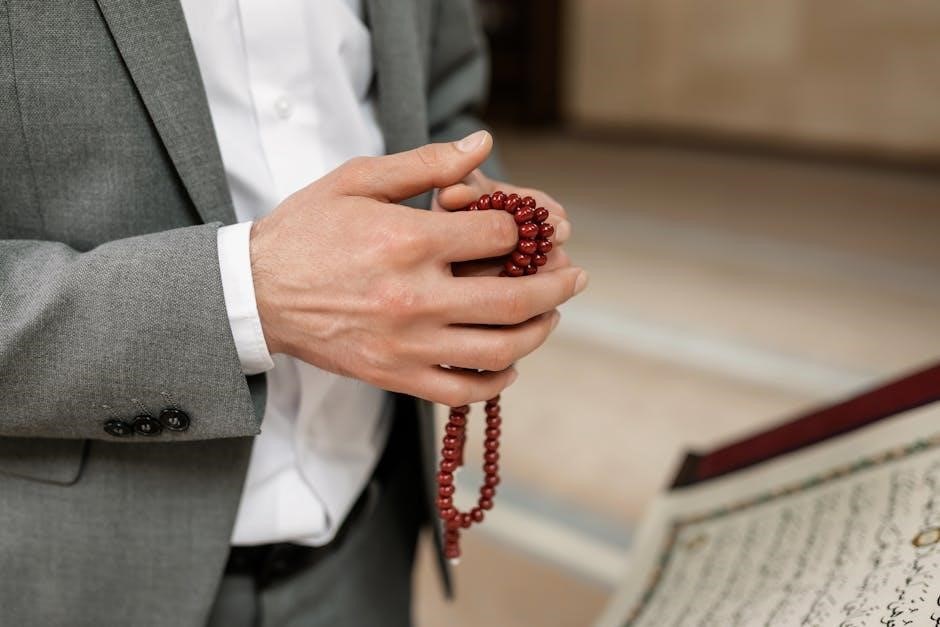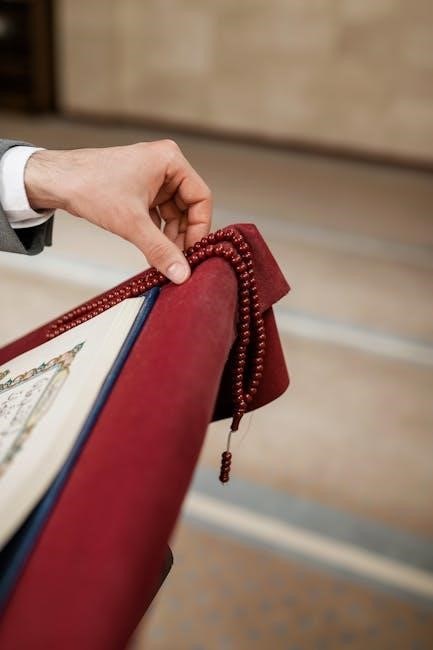dua qunoot pdf
Find the Dua Qunoot PDF here. Download the complete guide for your prayers. Easy to read and share.
Dua Qunoot is a significant Islamic prayer seeking divine intervention‚ guidance‚ and protection‚ recited during specific prayers like Witr‚ to strengthen one’s spiritual connection with Allah.
Overview of Dua Qunoot and Its Significance
Dua Qunoot is a profound supplication in Islam‚ recited primarily during the Witr prayer‚ seeking Allah’s guidance‚ protection‚ and forgiveness. It is a moment of deep spiritual connection‚ emphasizing reliance on divine mercy. The prayer‚ taught by Prophet Muhammad (peace be upon him)‚ consists of five heartfelt requests: guidance‚ piety‚ chastity‚ relief from hardship‚ and divine pleasure. Its significance lies in its ability to strengthen faith‚ foster humility‚ and provide solace during challenging times‚ making it a cherished practice among Muslims worldwide.

The Meaning and Historical Background of Dua Qunoot
Dua Qunoot is a supplication seeking divine intervention and mercy‚ rooted in Islamic tradition as a plea for help during times of crisis and need.
Etymology and Linguistic Interpretations of “Qunoot”
The term “Qunoot” originates from the Arabic root “q-n-t‚” meaning “to stand” or “to be steadfast.” Linguistically‚ it signifies humility and devotion‚ reflecting the posture of a worshipper seeking divine aid. In Islamic tradition‚ “Qunoot” embodies the act of supplication‚ emphasizing submission and reliance on Allah. Its etymology underscores the prayer’s purpose: a heartfelt plea for guidance‚ protection‚ and forgiveness‚ aligning the believer’s will with divine wisdom. This linguistic foundation enriches the spiritual depth of Dua Qunoot‚ making it a profound expression of faith and surrender.
Historical Context and Origins of Dua Qunoot
Dua Qunoot traces its origins to the Prophet Muhammad (PBUH)‚ who introduced it during times of hardship and divine testing. It was revealed to address the challenges faced by the early Muslim community‚ offering a supplication for relief and guidance. Historically‚ Qunoot became a means to seek Allah’s intervention‚ particularly during crises or oppression. Its establishment in Islamic practice underscores its role as a collective and individual plea for divine aid‚ reflecting the Prophet’s teachings on submitting to Allah’s will during adversity.

Benefits and Spiritual Significance of Dua Qunoot
Dua Qunoot offers spiritual purification‚ strengthens divine connection‚ and provides guidance. It seeks Allah’s help‚ protection‚ and blessings‚ fostering a deeper reliance on His mercy and wisdom.
Spiritual Purification and Divine Connection
Dua Qunoot facilitates spiritual purification by awakening the soul to Allah’s presence‚ fostering humility and sincerity. It deepens the believer’s connection with the Almighty‚ allowing for heartfelt supplication and introspection. Through its recitation‚ one seeks forgiveness‚ cleansing the heart from worldly distractions and evil inclinations. This sacred prayer enhances self-awareness‚ enabling believers to draw closer to Allah‚ seeking His mercy and guidance in times of need; It serves as a powerful means to rejuvenate one’s faith and spiritual vitality.
Seeking Guidance and Blessings Through Dua Qunoot
Dua Qunoot is a profound supplication seeking Allah’s guidance‚ blessings‚ and protection. It serves as a heartfelt plea for divine assistance in navigating life’s challenges and decision-making. The prayer emphasizes requesting five key blessings: forgiveness‚ guidance‚ health‚ prosperity‚ and protection from evil. By reciting Dua Qunoot‚ believers invoke Allah’s mercy‚ seeking His favorable intervention in their affairs. This supplication fosters a deep sense of reliance on Allah‚ offering comfort and reassurance in times of hardship. It is a powerful tool for those seeking divine blessings and a stronger spiritual bond.

When and How to Recite Dua Qunoot
Dua Qunoot is typically recited in the third rakat of Witr Salah‚ offering a moment to seek divine intervention‚ blessings‚ and protection during times of need and hardship.
Recommended Times for Recitation
Dua Qunoot is ideally recited during the third rakat of Witr Salah‚ a night prayer. It is also recommended during times of distress or need‚ seeking divine intervention. Additionally‚ reciting it in the last third of the night and during Laylat al-Qadr amplifies its spiritual impact‚ offering a profound connection with Allah and His blessings. Regular recitation fosters a deeper sense of reliance on Allah‚ providing comfort and guidance in challenging circumstances.
Step-by-Step Guide to Reciting Dua Qunoot
Begin by standing in the third rakat of Witr Salah‚ raising your hands in Dua position. Recite the Arabic text of Dua Qunoot‚ either from memory or a reliable source‚ focusing on its meaning. Ensure proper pronunciation and maintain a humble demeanor. After recitation‚ lower your hands and proceed with the remaining prayers. This structured approach enhances the spiritual impact and connection with Allah‚ seeking divine guidance and intervention in one’s life.

The Structure and Content of Dua Qunoot
Dua Qunoot is composed of Arabic text‚ transliteration‚ and English translation‚ providing a clear structure for understanding and memorization‚ focusing on its divine requests and meanings.

Understanding the Five Requests in Dua Qunoot
Dua Qunoot contains five heartfelt requests to Allah‚ seeking guidance‚ protection‚ and blessings. These include asking for divine help‚ forgiveness‚ and refuge from harm. The supplication emphasizes trust in Allah’s mercy and wisdom‚ reflecting a deep spiritual connection. Each request is a profound expression of faith‚ highlighting the believer’s dependence on Allah for all aspects of life. This structure makes Dua Qunoot a comprehensive and meaningful prayer‚ encapsulating essential Islamic values and devotion.
Arabic Text‚ Transliteration‚ and English Translation
The Arabic text of Dua Qunoot is recited in the third rakat of Witr Salah. Its transliteration helps non-Arabic speakers recite it accurately‚ while the English translation reveals its profound meaning. The prayer includes requests for guidance‚ forgiveness‚ and protection‚ emphasizing trust in Allah’s mercy. This structured approach ensures understanding and memorization‚ making it accessible for all believers to connect deeply with the divine message conveyed in Dua Qunoot.

Dua Qunoot in Different Prayers
Dua Qunoot is primarily recited in Witr prayer‚ particularly in the third rakah. It is also practiced in Qunut Nazilah during times of crisis‚ seeking divine assistance.
Dua Qunoot in Witr Prayer
Dua Qunoot is an essential supplication recited in the Witr prayer‚ specifically in the third rakah. It is a cherished practice taught by Prophet Muhammad (ﷺ) to seek Allah’s guidance and protection. The prayer consists of five heartfelt requests‚ emphasizing divine aid‚ forgiveness‚ and refuge from evil. Reciting it during Witr‚ after Isha and before Fajr‚ is highly recommended due to its spiritual significance and the blessed timing.
By incorporating Dua Qunoot in Witr‚ believers strengthen their connection with Allah‚ seeking His mercy and blessings. It is a moment of deep reflection and surrender‚ fostering a sense of reliance on divine providence.
Dua Qunoot in Qunut Nazilah
Dua Qunoot is also recited in Qunut Nazilah‚ a special supplication performed during times of war‚ calamities‚ or oppression. It serves as a collective plea for Allah’s intervention and relief. Unlike the Witr prayer‚ Qunut Nazilah is recited when facing specific challenges‚ seeking divine help to overcome them. This practice reflects the Islamic community’s reliance on Allah during hardships‚ emphasizing unity and trust in His mercy and guidance.

Common Mistakes to Avoid When Reciting Dua Qunoot
Forgetting to recite Dua Qunoot during Witr or Qunut Nazilah and losing concentration during recitation are common errors that disrupt its spiritual impact and continuity.
Forgetting Qunoot and Its Implications
Forgetting to recite Dua Qunoot during Witr or Qunut Nazilah can disrupt the spiritual flow and invalidate the prayer’s completeness. It may also diminish the supplication’s intended blessings and divine connection. If one forgets Qunoot‚ they should seek Allah’s forgiveness and ensure continuity in future recitations to maintain the prayer’s integrity and spiritual benefits. Consistency in reciting Dua Qunoot is crucial for maximizing its impact and fulfilling the ritual’s purpose effectively.
Maintaining Continuity and Flow During Recitation
Maintaining Continuity and Flow During Recitation

Maintaining continuity and flow during Dua Qunoot is essential for its spiritual impact. One must focus on the words and their meanings to avoid distractions. If interrupted or disturbed‚ the recitation should resume promptly to preserve the prayer’s integrity. Consistency in reciting Dua Qunoot fosters a deeper connection with Allah and enhances its blessings. By prioritizing mindfulness and concentration‚ believers can ensure a seamless and meaningful recitation‚ fulfilling the purpose of this sacred supplication.
Dua Qunoot is a profound supplication‚ offering believers a pathway to divine blessings‚ spiritual growth‚ and eternal guidance‚ emphasizing trust in Allah’s mercy and wisdom always.
Final Thoughts on the Importance of Dua Qunoot
Dua Qunoot is a powerful supplication that reflects a believer’s devotion and reliance on Allah. It serves as a heartfelt plea for divine intervention‚ forgiveness‚ and blessings. The five requests within the dua—guidance‚ forgiveness‚ health‚ sustenance‚ and protection—highlight its comprehensive nature. Recited primarily in Witr prayer‚ it strengthens spiritual connection and trust in Allah. While optional‚ its benefits make it a recommended practice for seeking comfort and strength. Embracing Dua Qunoot enriches one’s faith journey‚ fostering a deeper bond with the Almighty.

